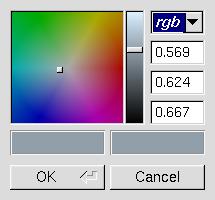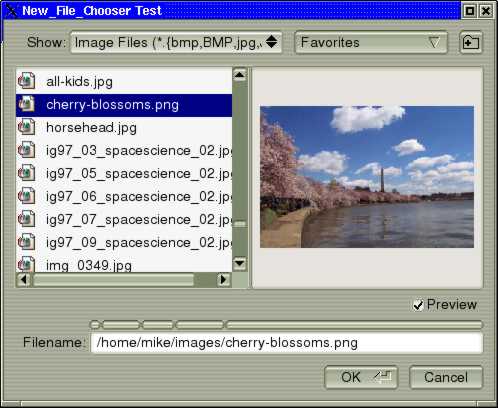|
| void | fl_alert (const char *fmt,...) |
| | Shows an alert message dialog box. More...
|
| |
| int | fl_ask (const char *fmt,...) |
| | Shows a dialog displaying the fmt message, this dialog features 2 yes/no buttons. More...
|
| |
| void | fl_beep (int type) |
| | Emits a system beep message. More...
|
| |
| int | fl_choice (const char *fmt, const char *b0, const char *b1, const char *b2,...) |
| | Shows a dialog displaying the printf style fmt message, this dialog features up to 3 customizable choice buttons. More...
|
| |
| int | fl_choice_n (const char *fmt, const char *b0, const char *b1, const char *b2,...) |
| | Like fl_choice() but with extended (negative) return values. More...
|
| |
| int | fl_color_chooser (const char *name, double &r, double &g, double &b, int cmode) |
| | Pops up a window to let the user pick an arbitrary RGB color. More...
|
| |
| int | fl_color_chooser (const char *name, uchar &r, uchar &g, uchar &b, int cmode) |
| | Pops up a window to let the user pick an arbitrary RGB color. More...
|
| |
| char * | fl_dir_chooser (const char *message, const char *fname, int relative) |
| | Shows a file chooser dialog and gets a directory. More...
|
| |
| char * | fl_file_chooser (const char *message, const char *pat, const char *fname, int relative) |
| | Shows a file chooser dialog and gets a filename. More...
|
| |
| void | fl_file_chooser_callback (void(*cb)(const char *)) |
| | Set the file chooser callback. More...
|
| |
| void | fl_file_chooser_ok_label (const char *l) |
| | Set the "OK" button label. More...
|
| |
| const char * | fl_input (const char *fmt, const char *defstr,...) |
| | Shows an input dialog displaying the fmt message. More...
|
| |
| void | fl_message (const char *fmt,...) |
| | Shows an information message dialog box. More...
|
| |
| void | fl_message_hotspot (int enable) |
| | Sets whether or not to move the common message box used in many common dialogs like fl_message(), fl_alert(), fl_ask(), fl_choice(), fl_input(), fl_password() to follow the mouse pointer. More...
|
| |
| int | fl_message_hotspot (void) |
| | Gets whether or not to move the common message box used in many common dialogs like fl_message(), fl_alert(), fl_ask(), fl_choice(), fl_input(), fl_password() to follow the mouse pointer. More...
|
| |
| Fl_Widget * | fl_message_icon () |
| | Gets the Fl_Box icon container of the current default dialog used in many common dialogs like fl_message(), fl_alert(), fl_ask(), fl_choice(), fl_input(), fl_password() More...
|
| |
| void | fl_message_title (const char *title) |
| | Sets the title of the dialog window used in many common dialogs. More...
|
| |
| void | fl_message_title_default (const char *title) |
| | Sets the default title of the dialog window used in many common dialogs. More...
|
| |
| const char * | fl_password (const char *fmt, const char *defstr,...) |
| | Shows an input dialog displaying the fmt message. More...
|
| |






